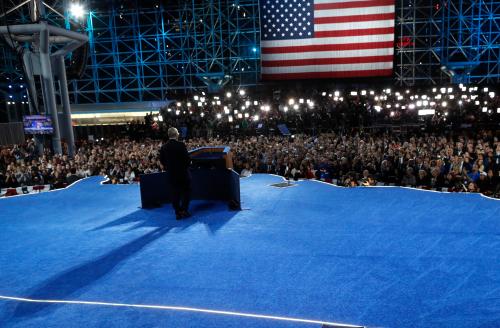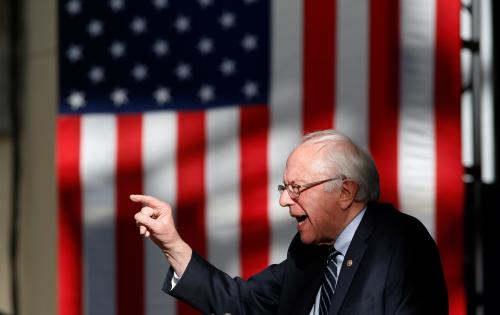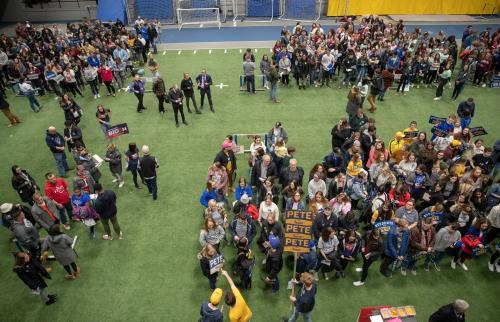This weekend, Democratic Party Chairwoman, Debbie Wasserman Schultz, announced her resignation in advance of the Democratic National Convention. Schultz’s exit comes amid revelations that DNC staffers were actively considering strategy in opposition to independent Vermont Senator Bernie Sanders during the Democratic primary.
Party chairs serve important roles in electoral politics, and never is that role more important than in advance of a presidential election. Party chairs fundraise, work closely with campaigns on strategy, conduct independent outreach efforts, craft effective messaging, and serve as important public surrogates on behalf of the party and its candidates. Some party chairs do this very publicly, while others more actively work behind the scenes. What a party chair cannot be, however, is a distraction. So it’s no surprise that after months of being one, the Democratic Party’s biggest distraction was ultimately shown the door.
In the tumult of this past weekend, the revelations were loud, but the silence among many party officials was deafening. The president did not put himself out there with a full-throated defense of his chairwoman—perhaps unsurprising given press coverage last year of a strained relationship between the chair and the president. You did not see the Clinton campaign step forward to protect Schultz from a rapidly growing, highly public flood of criticism. You did not see elders from the Democratic National Committee—all on their way to or already in Philadelphia for the convention—passionately calling for Schultz to stay. Nor did a powerful group of state party chairs come to her aid.
One could argue that the magnitude of the scandal meant that party officials understood Schultz could not be saved, but that is nonsense. Sanders supports are rightly angry about the email allegations—allegations that were never denied. But ultimately, if Democratic Party leadership—and particularly the president and presidential nominee—wanted Schultz to stay, she would have stayed. They didn’t.
Schultz’s dismissal—just a day before the party convention is set to begin and about 100 days before the election—signals how toxic her leadership had become. The party was more comfortable with a pre-election leadership crisis than with her leadership. For a party confident it will win the White House, hopeful it will win back control of the Senate, and wistfully thinking about large gains in the House, the Democratic Party machinery needs to work smoothly and effectively. A problem in party leadership puts those goals at risk.
Enter Donna Brazile. Brazile is a long time party insider and Clinton ally. As Vice Chair of the Democratic Party, Brazile becoming interim chair is both organizationally sensible, and functionally safe—she understands how to run a national party. While Brazile would certainly not be the first choice of the Sanders wing of the Democratic Party, ABD—Anyone But Debbie—will do. Brazile will be criticized for being too much of an insider (what a party leader needs to be), too entrenched in the establishment, not progressive enough to satisfy Sanders’ supporters demands, and too close to Clinton.
However, her title is “interim chair,” and after the election a new permanent chair will be selected. The party will now avoid an effort from Schultz to stay on post-election, an additional distraction that would have created more division and strife within the party. In the meantime, Brazile’s duty is threefold. First, she must steer the party through its current scandal—almost certainly by making sure that more heads roll than just the chairwoman’s—and calming the nerves and concerns of party progressives. Next, she must work closely with campaigns and state party officials to build and execute a strategy to ensure Democrats get elected across the country. Finally, she must ensure that the party apparatus is not used simply to position eager individuals to set up their bid for the party chair come November.
Brazile has a tall order and there are frankly few people institutionally positioned to guide the party through that process. Yet, all along, she must be mindful that there are swaths of the party that still sting from the primary and hurt all the more from the email revelations. As much as Brazile and the DNC team must serve the presidential nominee and nominees down ballot, she must recognize the necessity to be “party healer” as much as “party chair.”
Over the coming six months, the Democratic Party will go through a transformation. It will have a new party leader, a new party chairman, and after the election, will likely enact dramatic changes with regard to how to nominate a president. There are many voices within the party who want a more progressive voice to lead the party after November. Some of the most progressive voices on Clinton’s VP shortlist might ultimately be well-positioned both to take over the party and steer it toward a more open embrace of progressive politics. However, regardless of the “who” there is a real attention on the “what,” and the “what” is leadership style and approach. Many Democrats want leadership that looks more like Howard Dean’s—a true commitment to a 50 state strategy that focuses as much on building state- and local-level institutions and the grassroots as it does on national fundraising. The party has grown tired of the Schultz’ leadership and organizational approaches, and while change was surely coming later in the year, the chairwoman’s exit makes such change ever more achievable.
The Brookings Institution is committed to quality, independence, and impact.
We are supported by a diverse array of funders. In line with our values and policies, each Brookings publication represents the sole views of its author(s).







Commentary
How interim DNC chair Donna Brazile can succeed in the next 100 days
July 25, 2016